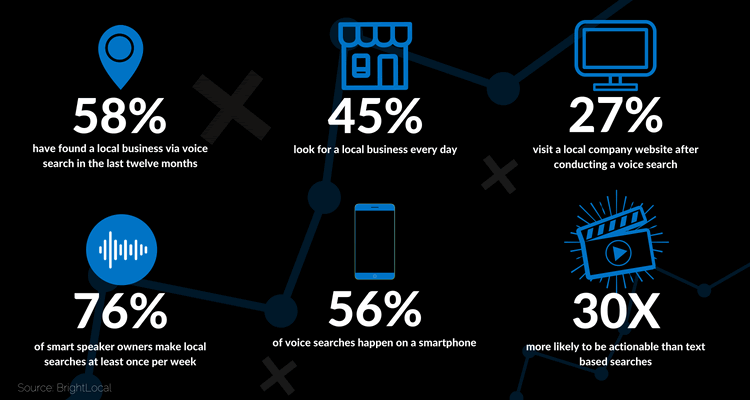What We Need To Know About Voice Search And SEO?
Nowadays it is not uncommon for people to be talking to their mobile phones, and with the rise of voice-first in-home devices, companies are beginning to ask us how voice search will affect their Local SEO in Houston.
There’s no question voice search is ramping up. It may surprise you, but Google revealed (all the way back in 2016) that 20 percent of its mobile search queries were voice searches. Now, in 2019 that amount is getting closer to 50 percent of the local phone searches are voice searches and will be at 50 percent by 2020. Analysts agree voice search should catch up with typed search within a few years: Voice search technology and acceptance are improving so rapidly that smart speakers are tracking to become a $4.8 billion business by 2022.
With this in mind, it’s important to distinguish between what you need to do to adapt your SEO to voice search now versus what you may need to do down the road. As with any rapidly evolving technology, it’s important to keep pace but it’s also risky to get too far ahead of the curve. Here are a few high-level factors to keep in mind as you ponder your options.

Consider the Search Behavior of Your Audience
Many, if not most, mobile device voice searches have local intent. So, if you are a local consumer business or a national consumer business running local SEO campaigns in target markets, voice search is more of a factor in keyword selection than if you were, say, a manufacturer of plastic molded parts.
This doesn’t mean you should ignore voice search in keyword selection if your market is still heavily desktop-oriented; it only means you can move at a slower pace. Ignoring voice search altogether is very risky. Consider what happened to some companies not long ago when they ignored mobile-friendly web design. Companies that waited too long to adapt found themselves playing frantic catch-up with competitors that had adapted earlier and were now enjoying significant organic site traffic from mobile users.
Knowing The Difference Between Typed-Search and Voice-Search Keywords
When people type search queries, they tend to keep them short and make them phrases — it’s easier than composing long, detailed sentences or questions. In contrast, when people use voice search, they tend to ask questions that are fairly detailed for the same reason — it’s easier. Hypothetical examples to illustrate the difference:
- Typed-search keyword: “steak restaurants Houston”
- Voice-search keyword: “where can I get a terrific steak near me”
- Typed-search keyword: “local seo Houston”
- Voice-search keyword: “where can I find a reliable local seo agency in Houston”
Note that certain phrases such as “near me” are common in voice search queries. As voice search becomes more popular, this phrasing will inevitably make its way into typed search. Adding “near me” to appropriate title tags and/or anchor text could be a great tweak to make now.
Craft On-Site Content Around Voice-Search Keywords
If your business figures to already be exposed to a decent volume of voice search, you’ll want to introduce new website pages or rework existing ones to incorporate some of these voice-search keywords.
One way to begin optimizing voice-search keywords is on your local business website. Posting articles that answer common questions asked by your target audience not only sets up well for voice keywords but also ensures your articles will be useful and engaging to readers.
For standard website pages that are already ranking well, optimizing the content to take advantage of Google featured snippets can give that content the most prominent exposure possible on a Google SERP (search engine results page). Doing this involves identifying common questions asked by your target audience that are relevant to the page’s content, and then weaving those questions and helpful responses into the text.
The more organized, precise and data-heavy the responses, the better. This approach to content, by the way, should also serve to make your web pages very persuasive which adds up to more conversions regardless of how your website visitors land on those pages.

As with everything SEO, there is no one-size-fits-all answer for adapting to voice search. The specific keywords, content adjustments, and on-site technical adjustments depend on a host of variables, including your audience’s current and near-future search behavior, what your competitors are or are not doing, and your current rankings.
If you’d like to discuss your voice-search Local SEO options in Houston in more detail, Please Contact Us Today. It’s certainly not too early to start making the right kind of changes.


